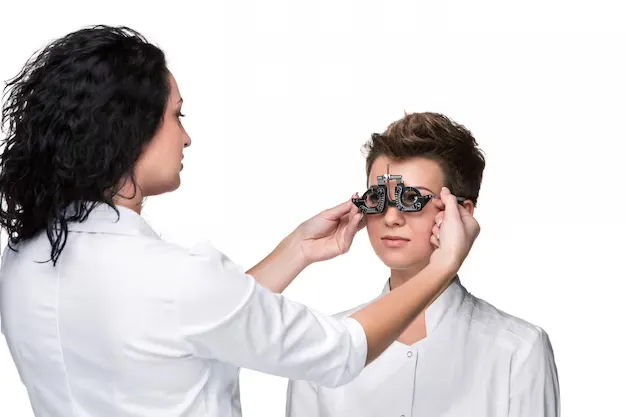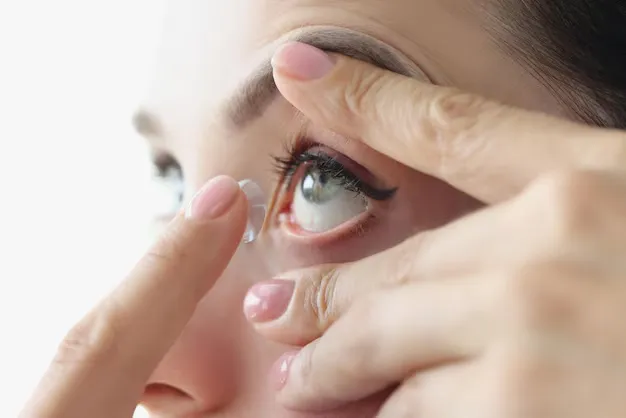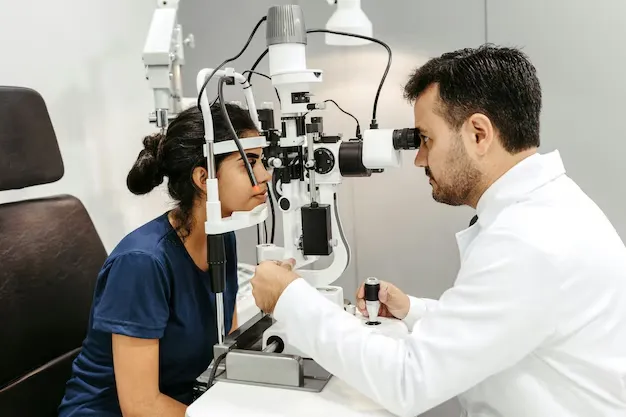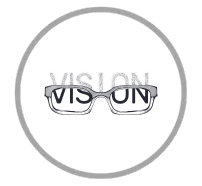Contact Lens Tips
How to Safely Transition from Glasses to Contact Lenses
FSDAVCFEBFEVSDDVFSD
FSDAVCFEBFEVSDDVFSD
FSDAVCFEBFEVSDDVFSD
Understanding Contact Lens Fitting
Switching from glasses to contact lenses may seem challenging, but with expert guidance, it becomes a seamless process. A professional contact lens fitting is the essential first step. This fitting ensures that the lenses align with the curvature of your eye and cater to your vision correction needs, reducing risks of discomfort or blurry vision.
During the fitting, an optometrist also assesses your eye health, considering factors like tear production and corneal shape to recommend the ideal lens type, whether soft, rigid, or specialty lenses. A proper fit not only enhances comfort and vision but also ensures a safe and smooth transition to contact lenses.
Switching from glasses to contact lenses may seem challenging, but with expert guidance, it becomes a seamless process. A professional contact lens fitting is the essential first step. This fitting ensures that the lenses align with the curvature of your eye and cater to your vision correction needs, reducing risks of discomfort or blurry vision.

During the fitting, an optometrist also assesses your eye health, considering factors like tear production and corneal shape to recommend the ideal lens type, whether soft, rigid, or specialty lenses. A proper fit not only enhances comfort and vision but also ensures a safe and smooth transition to contact lenses.

Tips for First-Time Contact Lens Wearers
Transitioning to contact lenses is an exciting change that requires care and patience for a smooth adjustment. Start by wearing your lenses for a few hours daily, gradually increasing the duration as your eyes become accustomed to them. This slow adaptation minimizes irritation and helps your eyes adjust comfortably to the new routine.
Maintaining proper hygiene is essential for safe lens use. Always wash and dry your hands thoroughly before handling your lenses to prevent dirt and bacteria from coming into contact with your eyes. Use only the cleaning solution recommended by your optometrist for storing and disinfecting your lenses. Avoid using tap water or other unapproved liquids, as they can damage the lenses or introduce harmful microorganisms, increasing the risk of infection.
Applying and removing lenses might feel challenging initially, but with practice, it becomes second nature. Your optometrist will demonstrate safe and effective techniques to ensure you can handle your lenses confidently. Take your time to learn these methods to prevent discomfort and maintain optimal eye health. By following these steps and adhering to your optometrist’s guidance, you can enjoy a seamless transition to contact lenses, experiencing clear vision and comfort while keeping your eyes healthy and well-protected.
Common Mistakes to Avoid

When transitioning to contact lenses, it’s essential to avoid common mistakes to protect your vision and maintain eye health. One of the most critical steps is adhering to the prescribed wear schedule. Overwearing lenses can lead to dry eyes, irritation, or even more severe complications. Always follow the recommendations provided by your optometrist to ensure safe and comfortable use.
Equally important is staying proactive with your eye care. Skipping follow-up appointments can result in unnoticed issues with lens fit or eye health.

Regular check-ups allow your optometrist to monitor your eyes and make necessary adjustments. Additionally, never ignore symptoms such as redness, discomfort, or blurred vision, as these may indicate underlying problems. If you experience any of these issues, consult your eye doctor promptly to address them before they worsen. By avoiding these pitfalls, you can ensure a smooth and safe transition to contact lenses.
Transitioning to contact lenses requires careful attention to ensure a safe and smooth adjustment. Proper awareness during this phase can help prevent unnecessary complications and promote long-term eye health. Start by strictly following your optometrist’s instructions regarding wear schedules and hygiene practices. Overwearing lenses or neglecting to clean them properly can lead to issues such as dry eyes, irritation, or infections. Always wash your hands before handling lenses and use the recommended cleaning solutions to maintain their integrity and safety.
Regular follow-ups with your optometrist are equally important. These appointments allow your eye care provider to monitor your progress, assess the lens fit, and address any concerns. Ignoring symptoms like redness, discomfort, or blurred vision can result in serious problems if left untreated. Early intervention ensures minor issues don’t escalate into major complications. By staying informed, adhering to prescribed care routines, and seeking professional guidance when needed, you can enjoy the benefits of contact lenses without compromising your eye health.
Choosing the Right Contact Lenses
Contact lenses are available in different types, such as daily disposables, bi-weekly, and monthly options, each catering to specific preferences and lifestyles. Daily disposables are perfect for those seeking convenience and optimal hygiene, as they eliminate the need for cleaning and storage. On the other hand, monthly lenses are more cost-effective for regular users, requiring proper cleaning and maintenance to ensure safety. Specialty lenses, such as toric lenses for astigmatism or moisture-rich lenses for dry eye conditions, address unique vision and comfort needs.
Choosing the right contact lens depends on various factors, including your daily activities, comfort preferences, and eye health. An optometrist will evaluate your vision needs and recommend the most suitable option. Their guidance ensures a seamless transition, balancing practicality, comfort, and eye safety. Whether prioritizing ease of use or affordability, the right lenses will enhance your vision and fit seamlessly into your lifestyle.
Maintaining Healthy Vision with Contact Lenses
Consistent care and monitoring are essential for a safe and comfortable experience with contact lenses. Start by adhering to the cleaning routine provided by your optometrist. Proper cleaning and storage of your lenses help prevent infections and maintain their functionality. Always use the recommended cleaning solution and avoid using water or other substances to clean lenses.

Consistent care and monitoring are essential for a safe and comfortable experience with contact lenses. Start by adhering to the cleaning routine provided by your optometrist. Proper cleaning and storage of your lenses help prevent infections and maintain their functionality. Always use the recommended cleaning solution and avoid using water or other substances to clean lenses.
Timely replacement of your contact lenses is equally important. Using lenses beyond their intended duration can lead to discomfort, irritation, or even eye infections. Follow the replacement schedule for your specific lens type whether daily, bi-weekly, or monthly and always have fresh lenses ready to use.
Additionally, scheduling regular eye exams is crucial. Over time, your vision or eye health may change, necessitating adjustments to your prescription or lens type. Routine check-ups ensure your lenses remain a perfect fit, providing lasting comfort and safety.
Timely replacement of your contact lenses is equally important. Using lenses beyond their intended duration can lead to discomfort, irritation, or even eye infections. Follow the replacement schedule for your specific lens type whether daily, bi-weekly, or monthly and always have fresh lenses ready to use.
Additionally, scheduling regular eye exams is crucial. Over time, your vision or eye health may change, necessitating adjustments to your prescription or lens type. Routine check-ups ensure your lenses remain a perfect fit, providing lasting comfort and safety.
When to Consider Specialty Contact Lenses
When standard contact lenses don’t provide the comfort or vision clarity you need, specialty lenses can offer a tailored solution. Designed for individuals with unique vision needs or specific eye conditions, these lenses address challenges that conventional lenses may not resolve.
Rigid Gas Permeable (RGP) Lenses are ideal for precise vision correction. Unlike soft lenses, RGP lenses maintain their shape on the eye, providing sharper focus and greater oxygen permeability. They are particularly effective for people with high prescriptions or corneal irregularities, ensuring clear and stable vision.
Scleral Lenses are a specialized option for those with irregular corneas, such as from keratoconus or post-surgery changes. These lenses rest on the sclera rather than the cornea, vaulting over the eye's surface to create a smooth optical zone. They also retain moisture, making them an excellent choice for managing dry eye conditions.
For individuals with astigmatism, Toric Lenses offer a customized solution. These lenses correct the irregular curvature of the cornea or lens, providing stable and clear vision. Available in both soft and RGP materials, toric lenses are designed to meet specific visual requirements. Specialty lenses cater to diverse needs, enhancing both comfort and visual quality. Consulting with your optometrist is the first step in finding the right solution. A thorough evaluation ensures a personalized approach to vision care, taking into account factors like corneal shape, prescription, and eye health. Specialty lenses not only resolve unique challenges but also empower individuals to enjoy better vision and overall comfort in their daily lives.
The Role of Professional Guidance

Transitioning to contact lenses is a significant step, and the expertise of an optometrist plays a vital role in ensuring the process is smooth and effective. They assess your unique vision needs and prescribe the most suitable lenses, considering factors like comfort, lifestyle, and eye health. This personalized approach ensures your lenses enhance your vision optimally.
An optometrist provides detailed guidance on proper lens care, including cleaning, storage, and wearing schedules. These instructions are essential to prevent discomfort, infections, and complications. Adhering to these practices not only prolongs the life of your lenses but also maintains your eye health.
Transitioning to contact lenses is a significant step, and the expertise of an optometrist plays a vital role in ensuring the process is smooth and effective. They assess your unique vision needs and prescribe the most suitable lenses, considering factors like comfort, lifestyle, and eye health. This personalized approach ensures your lenses enhance your vision optimally.
An optometrist provides detailed guidance on proper lens care, including cleaning, storage, and wearing schedules. These instructions are essential to prevent discomfort, infections, and complications. Adhering to these practices not only prolongs the life of your lenses but also maintains your eye health.
Additionally, a professional evaluation helps identify any underlying eye conditions that could impact your ability to use contact lenses. Early detection and management of such issues ensure a safer transition. By following expert recommendations, you can confidently embrace the benefits of contact lenses without compromising your eye health.
Additionally, a professional evaluation helps identify any underlying eye conditions that could impact your ability to use contact lenses. Early detection and management of such issues ensure a safer transition. By following expert recommendations, you can confidently embrace the benefits of contact lenses without compromising your eye health.
Take the First Step Today
Ready to switch from glasses to contact lenses? At Kleinwood Vision, we make the transition smooth and comfortable. Our professional contact lens fittings are designed to assess your unique vision needs and lifestyle. From selecting the right type of lenses to ensuring a proper fit, our optometrists guide you through every step. Whether you’re new to contacts or updating your prescription, we’re here to help you experience clear, comfortable vision.
Start your journey today by scheduling your fitting at Kleinwood Vision. Our experts also provide personalized tips for proper lens care and maintenance, ensuring your eyes stay healthy and your lenses last longer. Don’t forget to visit our blog for additional insights and advice on maintaining healthy vision. Embrace the freedom and convenience of contact lenses with confidence your eyes deserve expert care every step of the way!

Contact Info
Hours of Operation
Mon - Fri | 9:00 AM - 5:00 PM
Sat - Sun | Closed
Holiday Hours: We are closed for the following holidays: New Years Day, Memorial Day, Independence Day, Labor Day, Thanksgiving Day, Christmas Day
© 2026 Kleinwood Vision. All rights Reserved.


